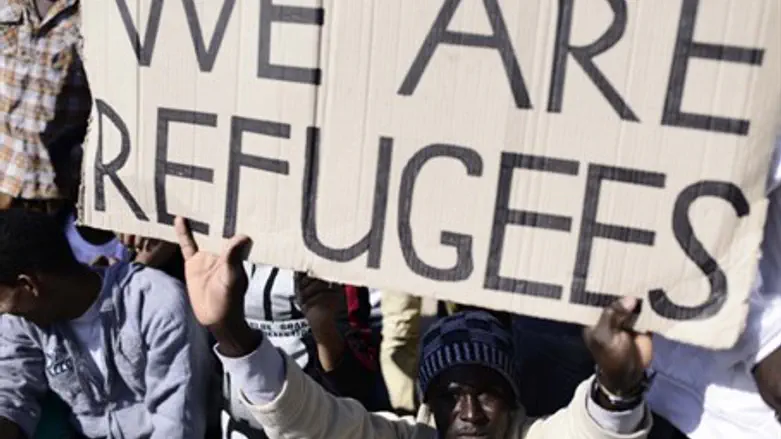
Prime Minister Binyamin Netanyahu will present an amended form of the Infiltrator Law to the government on Sunday, after the bill to send illegal aliens to the Holot detention center was struck down by the High Court of Justice.
The new version of the law, formulated by Netanyahu, the Interior Ministry and the Justice Ministry, mandates that asylum seekers will stay in Holot for one year and eight months - eight months more than the period proposed by the original law.
New infiltrators caught in Israel illegally will be sent to the Saharonim prison for three months, as well - less than the one-year period in the original law.
In addition, the state will try to ensure that asylum seekers leave the country in several ways. With the approval of the law, employers will be required to deposit a monthly fee for employing asylum seekers, at the expense of severance pay. In addition, each asylum seeker working in Israel will be required to deposit money from his/her own paycheck, which he/she will receive only upon leaving Israel.
Today, asylum seekers may be employed, as long as they have valid work permits and have not yet been summoned to Holot. In order to prevent the employment of other asylum seekers, the Knesset is currently considering other bills to increase fines for employers who hire infiltrators. Also in the works are measures to prevent hiring infiltrators by contractors, such that companies found to be guilty of code violations will be banned from hiring foreign workers for three years.
After approval of the government and the Knesset on Monday, the Interior Committee will meet on Tuesday to debate the bill to prepare it for a Knesset plenum vote.
The state will speed up the process of approving the law due to the High Court ruling, which demanded that Holot be closed within three months of the decision, i.e. by December 22.
The amendment will be voted upon in the Knesset plenum on Monday.
Human rights or human safety?
Illegal immigration - especially from Eritrea and Sudan - is a hotly debated topic in Israel.
The issue is a matter of public perception versus public safety. While proponents of the High Court ruling argue that the detention center is a "human rights" issue, a direct correlation has also been made between infiltration and violent crime.
Residents of south Tel Aviv have been suffering from endless harassment perpetrated by tens of thousands of illegal Eritrean and Sudanese infiltrators who enter Israel to find employment and come to live in their working class neighborhoods. Many Jewish residents say they are terrified of leaving their homes and have begged the government to take action.
While violence has ruled the streets of those neighborhoods for years, controversy was sparked again recently after the High Court’s decision to strike down key sections of the Infiltrators Law, which made it possible to detain illegal immigrants without trial for up to one year.
The violent crime rate in south Tel Aviv is now several times higher compared to the average for other sections of the major city. Sexual offenses in neighborhoods with large percentages of infiltrators have been recorded as occurring at a rate 3.5 times higher than found in the general population, violent crime 2.5 times higher than in the general population, and robbery 6 times higher than in the general population.
However, controversy regarding new laws preventing illegal immigration - including a smear campaign against Israel's handling of the 60,000 migrants run by NGOs, leftist groups, and the UN - postponed judgement on the petition while Israel repaired damage to its image.
Critics have noted that the demonstrations appear to have been organized from the outside, and say that various interest groups are misrepresenting the detention facility, which provides illegal entrants with several services.
A top-ranking official at the State Attorney's Office noted in June, moreover, that the "human rights" campaign launched against Israel and its legislature against infiltrators ignores blatant facts about asylum seekers in Israel.
The official, Attorney Yochi Genison, noted that of the infiltrators, "only two Eritreans have ever received refugee status; it became clear that the rest are not eligible for the status [under international law]. They have no problem to leave the country. They can return to their country; if they do not say they were in Israel, they would have no danger in returning."